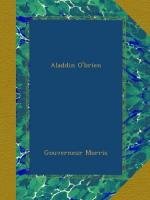XI
Aladdin had a large acquaintance in the town among all sorts of men, and, as he went home sorrowfully in the rain, he met a youth, older than himself, who had an evil notoriety; for being born with brains, of respectable people, and propitiously launched on the world, he had begun in his early teens, and in the face of the most heartrending solicitude, to drink himself to death. The miserable part of it was that everybody loved him when he was sober, and out of consideration to his family still asked him to the best that the town could do in the way of parties and entertainments. He was a good-looking young man with a big frame and a pale face. His real name was William Addison Larch, but he was better known as “Beau Larch.” He had a nervous, engaging smile, of which he made frequent use.
“My word, Aladdin,” he said, “you look sick as a dog. Come with me and take a snifter for it.”
Aladdin hesitated a moment. And as soon as he had thoroughly made up his mind that it was wrong to say so, he said:
“I believe I will.” The Celt in him was feeling suicidal. They went into the ground-floor room of a house where liquor was sold.
“For me, whisky,” said Beau Larch.
“The same for me,” said Aladdin, with something suspiciously like a gulp. The first drink which a man takes against his better judgment is a grisly epoch in his life. Aladdin realized this, and was at once miserable and willing that it should be so.
“To those that love us!” said Beau Larch.
Aladdin put down his liquor without grimace or gasp.
Beau Larch paid.
In Aladdin’s pocket were three dollars, the first mile-post on the steep road to his ideal. He felt, to be sure that they were there.
“Now you ’ll have one with me,” he said.
When the sudden rain-storm had rained and thundered and lightened itself out, they went to another saloon, and from there to the Boat Club, of which Beau Larch was a member and whither he asked Aladdin to supper. Fishes and lobsters and clams were the staple articles of Boat Club suppers, and over savory messes of these, helped down with much whisky and water, Aladdin and Beau Larch made the evening spin. Aladdin, talking eagerly and with the naivete of a child, wondered why he had never liked this man so much before. And Larch told the somewhat abject story of his life three times with an introduction of much racy anecdote.
Aladdin’s head held surprisingly well. Every now and then he would hand himself an inward congratulation on the alertness and clearness of his mind, and think what a fine constitution he must have. They got to singing after a while, and reciting poems, of which each knew a quantity by heart. And, oddly enough, Aladdin, though he had been brought up to speak sound American, developed in his cups, and afterward clung to, in moments of exhilaration or excitement, an indescribably faint but perfectly distinct Hibernian accent. It was the heritage to which he was heir, and made his eager and earnest rendering of “Annabel Lee” so pathetic that Beau Larch wept, and knocked a glass off the table. . . .




